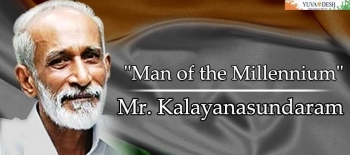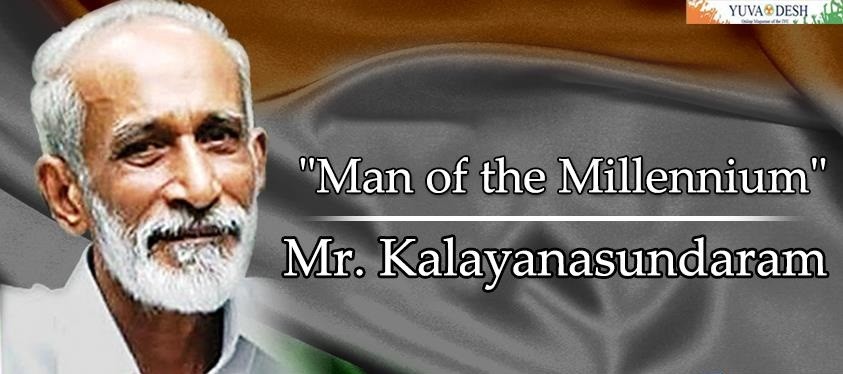
.jpg) F. M. Britto
F. M. Britto

The mother struggled to bring up the one year old Palam Kalyana Sundaram after the demise of his father. Since there was no school, electricity, bus or even proper road in his small village of Mela karivelam kulam in Tirunelveli district of Tamil Nadu, the small fellow had to walk up and down ten kilo meters every day to school. No other child was going to school from his village, since they had to pay five rupees as monthly fee. So from her hard labour, his mother gave other children’s fees, books and even clothes so that they too would go to school with him. Thus from childhood Kalyana Sundaram learned to share with others.
He desired to learn his rich Tamil culture and history by taking Tamil literature for his Master’s degree. Seeing his interest, the founder of the MTT College, not only introduced the subject, but also sponsored his education. So again Kalyana Sundaram saw others’ generosity in his education.
Inspired by the radio speech of then Prime Minister Jawaharlal Nehru appealing for donations during the Indo-China War in 1962, Kalyana Sundaram went to his Chief Minister Kamaraj and offered his thin gold chain for the defense. So impressed by this generous act of the young lad, Kamaraj felicitated him on 1963 May Day.
Earning another Masters in Library Science with Gold Medal, he worked as a librarian in Srivai kuntam’s Kumar Kurupara Arts College for 35 years. Kalyana Sundaram donated all his monthly salary, his one lakh rupees salary arrears, his pension of Rs 10 lakh, the money from the sale of his ancestral property – all towards the education of poor children. Not wishing to spend his money for the upkeep of his family, but to donate to the poor children, he remained a bachelor. He has donated more than 30 crore rupees. “I simply do not wish to own anything,” he says.
After his retirement he formed Palam Foundation to meet the poor children’s educational needs. One can become its member by contributing one rupee a month or Rs 100 as life membership. They also accept anything like old newspapers, clothes and utensils to help the needy.
The Union government awarded him the country’s best librarian. The International Biographical Centre of Cambridge honored him as one of the “noblest men of the world” of the 20th century. An American organization felicitated him with the Man of the Millennium Award, the Rotary Club of India credited him in 2011 with Life Time of Service Award and The United Nations recognized him as one of the most outstanding people of the 20th century.
Looking like a common, poor man, Kalyana Sundaram has never kept a paisa for himself. The 80 years old frail man with a shy smile works as a waiter in a hotel for his two meals and to meet his simple personal needs.
Kalyana Sundaram says, “We cannot sustain ourselves unless we contribute to society in some way or the other. Finally what do we take with us when we leave the planet earth?”